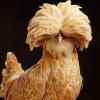After reading a thread here, I did some cursory research on an herb that sparked my interest, Gotu Kola. While its been a staple in many of the stacks on this forum, I always assumed it was just another adaptogen. After researching it, however, I see how the numerous nueroprotective actions of it seem to be owed in large part to its positive effect on reducing anxiety. I searched specifically for its effects on anxiety and found, along with positively GLOWING forum endorsements by people with social anxiety, a couple studies that seem to corroborate these findings:
http://www.ncbi.nlm....1&dopt=Abstract
Investigations of the pharmacologic profile of medicinal plants have revealed that a number of plants with purported anxiolytic activity bind to cholecystokinin (CCK) receptors. This finding is intriguing in view of the proposed involvement of CCK in the pathophysiology of fear and anxiety. This double-blind, placebo-controlled study was undertaken to evaluate the anxiolytic activity of Gotu Kola (Centella asiatica) in healthy subjects. Gotu Kola has been used for centuries in Ayurvedic and traditional Chinese medicine to alleviate symptoms of depression and anxiety. Recent studies in the rat have shown that long-term pretreatment with Gotu Kola decreases locomotor activity, enhances elevated-plus maze performance, and attenuates the acoustic startle response (ASR). In this study, the authors evaluated the effects of Gotu Kola on the ASR in humans. Subjects were randomly assigned to receive either a single 12-g orally administered dose of Gotu Kola (N = 20) or placebo (N = 20). The results revealed that compared with placebo, Gotu Kola significantly attenuated the peak ASR amplitude 30 and 60 minutes after treatment. Gotu Kola had no significant effect on self-rated mood, heart rate, or blood pressure. These preliminary findings suggest that Gotu Kola has anxiolytic activity in humans as revealed by the ASR. It remains to be seen whether this herb has therapeutic efficacy in the treatment of anxiety syndromes.
[Article in Chinese]
Chen Y, Han T, Rui Y, Yin M, Qin L, Zheng H.
Pharmacy School, Shanghai Jiao Tong University, Shanghai.
OBJECTIVE: To investigate the possible effect of antidepressant effect of total triterpentes of Centella asiatica. METHODS: The corticosterone levels in serum were measured by fluorescence spectroscopy. The contents of monoamine neurotransmitters and their metabolites in rats cortex, hippocamopus and thalamus were evaluated by using HPLC with electrochemical detector. RESULTS: Significant reduction of the corticosterone level in serum and increase of the contents of 5-HT, NE, DA and their metabolites 5-HIAA, MHPG in rat brain were observed. CONCLUSION: The antidepressant effect of total triterpenes of Centella asiatica may be involved in ameliorating the function of HPA axis and increasing the contents of monoamine neurotransmitters.
So on the promise conferred by these two scientific studies and many supporters on other forums who swear by the stuff, as well as hearing about it on this forum, I've decided to buy some for myself and give it a whirl. Before I start, though, I had a few questions.
First of all, what is the recommended dosage for Gotu Kola when taken for anxiety? I have 100 475mg capsules that I bought from Nature's Way. Also, how long does it typically take to start working and what is the duration of its effects? Lastly, is it a depressant, and if so, is it safe to consume alcohol on a day that I also take this supplement?
.
Edited by chrono, 16 November 2011 - 07:06 AM.


















































